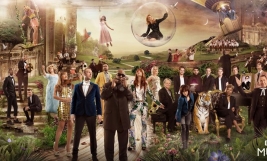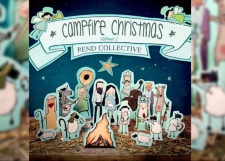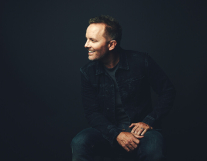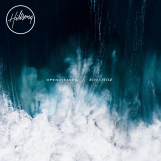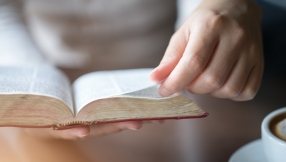Philosopher Professor Roger Scruton lamented recently about the tyrannical omnipresence of pop music:
"In almost every public place today the ears are assailed by the sound of pop music. In shopping malls, public houses, restaurants, hotels and elevators the ambient sound is not human conversation but the music disgorged into the air by speakers... I don't think we should underestimate the tyranny exerted over the human brain by pop. The constant repetition of musical platitudes, at every moment of the day and night, leads to addiction. It also has a dampening effect on conversation."
It's easy to write off the septuagenarian scrooge-like cynicism as snobbery; Scruton argues that "pop addicts lose the capacity for genuine musical experience... [like] the magical encounter with the Beethoven quartet." Even though I much prefer popular music to classical, as I listened to Adele's new smash hit album '25' this weekend I thought the professor may have a point to make. If any album is going to shape the public consciousness this festive period, it will be Adele's. Her last album sold over 30 million copies in the US alone and this one is on track to become the fastest selling album of all time. No doubt you have already come across its omnipresence on the airwaves, so it may be worth stopping and asking a few questions about it.
1. Do lyrics matter any more?
It was the lyrics of 25 that I found engaging and intriguing, more so than the music – which I have to say I found a little predictable. Some will say that lyrics are irrelevant to an album's musical worth and part of me believes Adele could actually sing the telephone directory and make it a moving experience. She has been called by Pitchfork magazine "inarguably, the greatest vocalist of her generation", and her range and control and musical instincts are staggering. But can a vocalist be great independent of the lyrics? I have to say yes – the early vocals of Michael Stipe of REM were almost indecipherable; their first full studio album was called Murmur as a result. Listening to music with my children I watch the contents of the lyrics wash over them. I have tried to get to the bottom of whether Fun's 2012 hit 'We are young' was about domestic violence or if Meghan Trainor's 2014 'All about the bass' encouraged female body dysmorphia.
And yet, after the outcry over the words to Robin Thicke's 'Blurred lines', or more positively the way that Band Aid's 'Do they know it's Christmas?' sparked interest in aid and development in my youth, I think we can argue that lyrics do matter. So looking closely at 25's lyrics can form part of our appreciation or critique of the album. Much of the critical reception for 25 has focused on its lack of musical diversity; some say Adele has played it too safe offering tracks that wouldn't have felt out of place on her earlier album, 21. I will focus my questions on what the lyrics seem to reveal.
2. Is Adele having a quarter life crisis?
Adele is actually 27 years old but she has released an album called 25 – perhaps it's a hint of how she is feeling about her age and stage in life. In an interview with the BBC, she said, "My last record was a break-up record, and if I had to label this one, I would call it a make-up record. Making up for lost time. Making up for everything I ever did and never did. 25 is about getting to know who I've become without realising. And I'm sorry it took so long but, you know, life happened." Truly a lot has happened to Adele in the last five years, including having a baby and worldwide fame and fortune. Yet despite all these positive experiences, there does seem to be a real emphasis on growing old on this album.
On the track 'River Lea' she sings: "Everybody tells me it's about time that I moved on. And I need to learn to lighten up and learn how to be young!"
Another example is the song that many have pointed to as the aesthetic zenith of the album, 'When we were Young', which is an unapologetic lament for lost youth: "Let me photograph you in this light, in case it is the last time, that we might be exactly like we were, before we realised, we were sad of getting old, it made us restless."
For a young woman who has experienced unprecedented commercial and critical acclaim this does not feel like a happy album. There is an air of lament on virtually every track. Many have commented that Adele feels like an old soul and this album seems to bear this out. The degree of nostalgia and bereavement present feels like someone looking back over a long and tortured life rather than a multimillionaire-making decade for a twenty-something. Is 25 perhaps the restless wrestling of someone who has reached the top of their profession but found it not enough? Tennis player Boris Becker spoke about a similar experience when he achieved success at a young age:
"I had won Wimbledon twice before, once as the youngest player. I was rich. I had all the material possessions I needed... It's the old song of movie stars and pop stars who commit suicide. They have everything, and yet they are so unhappy. I had no inner peace. I was a puppet on a string."
Listening to 25 I am reminded of the story of Jesus and the rich young ruler in Luke chapter 18. On paper this young man had it all: youth, wealth and influence. But none of this proved to be enough for him; he still came to Jesus asking what he had to do to inherit eternal life. Looking at this story, the experiences of Boris Becker and perhaps Adele's lyrics, do we see evidence of a hunger and yearning for something more than the best our world has to offer? Is it perhaps a longing for something only God can provide?
3 Can rich people sing the blues?
Veteran Blues and Jazz vocalist Jimmy Rushing once said, "The blues comes right back to a person's feelings, to his daily activities in life. But rich people don't know nothing about the blues, please believe me." He was adamant that someone's musical performance could not be divorced from their life experience. Does the writer's block that delayed Adele's latest album underline the significance of Rushing's observation? Adele herself commented in a recent interview "I had to write an album about real life, because otherwise how can you be relatable? If I wrote about being famous – that's boring." Paradoxically, it seems the more you have the less you have to sing about, and the less you have the more you have to sing about. Strangely, God was concerned about the way that affluence can be damaging not just to creativity, but faith itself, when he warned the Israelites leaving the captivity of Egypt:
"Be careful that you do not forget the Lord your God, failing to observe his commands, his laws and his decrees that I am giving you this day. Otherwise, when you eat and are satisfied, when you build fine houses and settle down, and when your herds and flocks grow large and your silver and gold increase and all you have is multiplied, then your heart will become proud and you will forget the Lord your God, who brought you out of Egypt, out of the land of slavery." (Deuteronomy 8:11-14)
Not only can financial success damage creativity, but according to Deuteronomy wealth can be hazardous to contentment and humility. Riches can damage your spiritual health.
4. Is there more to life than romantic love?
Every song on 25 reflects on some aspect of romantic love, and most of it highlights the need for reconciliation after a break up. 'Hello' talks about the longing to find some kind of peace and in 'River Lea', Adele sings about the way that each of her relationships has been poisoned by her pain. She defiantly declares that her love for her partner isn't 'Water under the Bridge' and on and on throughout each song. Romantic love is of course a rich seam to mine for inspiration, but it does sadly give the album a monochrome flavor. Is there more to life than brooding over a broken romance? What of friendship? Motherhood? Justice? This album may well provide the soundtrack to many a car journey but it doesn't offer us much direction. As I listened, I was reminded of a song by Nina Simone, 'Ain't got no. I got life', in which Simone recognised the losses of status and dignity that many, particularly black people in the USA at that time, were facing and yet still sought to remember all the things that could not be taken from them. Simone was a civil rights activist that used her status and profile to highlight injustice in the world. By comparison, Adele's songs feel more narcisstic and self indulgent.
What Adele reveals of herself in her public performances is eminently likeable. This video clip where she impersonates an Adele impersonator is fantastic. I'd love to be able to tell her about a God that loves her more securely than any romantic relationship – a God that can meet the deepest longings she expresses in her music and can help us face growing older with confidence not with despair. Listening to Adele, I was reminded of the woman at the well in John chapter four. Jesus meets a woman thirsty for more in life after a number of failed relationships. Jesus affirms this woman, even though culturally she was from the wrong race, the wrong background and in his day the wrong gender for him to be doing so. Jesus offers her a living water that will quench any thirst and that wells up to eternal life. This album feels like a cry of thirst for something that only God can satisfy.
5. Is there more to Adele than introspection?
I am grateful that as a young woman in the pop industry Adele has modelled a maturity and dignity about her image. She hasn't relied on sexually provocative songs, costumes or dancers to sell records. The sheer excellence of her musicality is in stark contrast to many of the processed and manufactured products of the pop industry. But with this much talent at her disposal, I wonder what she will ultimately do with it? Adele has the capacity to move millions with her vocal gifts, but where will she move them? It's hard not to quote Spiderman: "With great power comes great responsibility." I just wonder if there's a way she can move people beyond introspection and out into a world in need.
In a recent interview Adele revealed a little about her song writing process. She explained: "That's how I know that I've written a good song for myself – it's when I start crying... It's when I just break out in tears in the vocal booth or in the studio, and I'll need a moment to myself."
The filter that determines Adele's song selection is whether it causes her an emotional response, so it's safe to assume that the songs on the album have passed this test for her. But the things that move Adele appear to be limited to her romantic experiences. What if Adele had encountered the suffering and celebrations of others around world? What if she had spent time with refugees, with the displaced, the poor, and the malnourished? What could her incredible gift do to open up the hearts of her listeners to more than just their own feelings but to empathise with the most needy? I'd like to invite Adele on a journey to experience more of the world and allow other people's joys and pain to shape what she sings.
Unlike Professor Scruton I am not panicked by pop music. I believe that music, whether popular or classical, can soothe the savage heart, bring solace and comfort, help us to experience transcendence and even hear the echo of God's voice. But music can also sensitise us to the needs of others and I would be excited if that is the next progression of Adele's stellar musical career. There is hope that it might be; one song, 'Remedy', stands out on 25. I am pretty sure it wasn't written with this in mind, but I wonder if you thought about the refugee crisis or the needs of vulnerable children while listening, it might change your perspective on those issues:
"I remember all of the things that I thought I wanted to be,
So desperate to find a way out of my world and finally breathe.
Right before my eyes I saw, my heart it came to life,
This ain't easy, it's not meant to be.
Every story has its scars.
But when the pain cuts you deep.
When the night keeps you from sleeping,
Just look and you will see,
That I will be your remedy.
When the world seems so cruel,
And your heart makes you feel like a fool,
I promise you will see,
That I will be, I will be your remedy."










